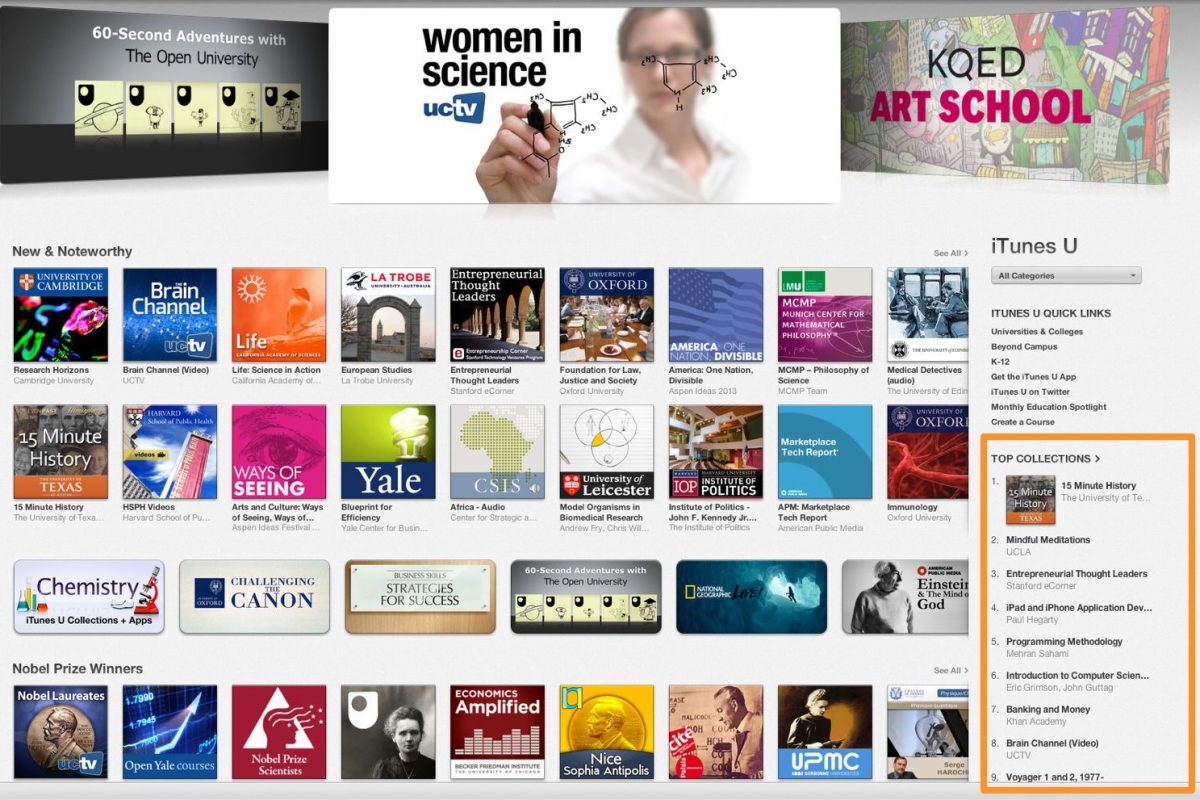What’s the real story behind medieval witch hunts and demonic possessions? Why did Siddhartha Gautama, the historical Buddha, set forth on a spiritual quest? Listen in as award-winning UT Austin faculty and graduate students unravel history’s enigmas in 15 Minute History, a podcast series created by the History Department’s Not Even Past and the university’s international outreach consortium Hemispheres.
Created for teachers, students and curiosity seekers, the podcast covers topics in world and U.S. history ranging from the Spanish Inquisition to the Cold War. Complete with supplemental materials, the episodes are aligned with state and national educational standards.
Since its launch in fall 2012, the podcast has amassed more than 15,000 visitors and recently landed the No. 1 spot in the ITunesU Collections. Joan Neuberger, history professor and Not Even Past editor, says the chart-topping podcast highlights the value of the university’s world-leading humanities research.
“Reaching the No. 1 ranking on iTunesU means that our small history/humanities site is more popular at the moment than any podcast on topics considered by some to be more ‘practical,’” says Neuberger, who co-created the podcast with Christopher Rose, outreach director for the Center for Middle Eastern Studies.
We sat down with Rose, who co-hosts the interviews with Neuberger, to learn more about the widely popular podcast – and why it’s important to pick up where the history classes left off.
Congrats on rising to the top of the ITunes U charts! What is it about this podcast series that appeals to the broader public?
It must be the Robert Goulet filter they use on my voice! (I’m joking. They don’t have a Robert Goulet filter. I asked.)
I’d like to think it’s because we’ve created an accessible way to explore all kinds of history. Each week it’s something new and different, but still interesting and easy to grasp. And if you want to know more, you can visit the website and explore the links and documents we’ve collected to go with that episode.
What made you decide to tie 15 Minute History to the standards of K-12 social studies courses in Texas?

The initial idea to do a history podcast came about when I was on the road a lot doing teacher training, which is part of my function at the Center for Middle Eastern Studies.
A bit of backstory: In 1996, when the Texas Essential Knowledge and Skills (TEKS) were introduced, the 10th grade course at the time, History of Western Civilization, was replaced with World History—but it wasn’t until the STAAR exams were proposed (they went into effect in 2012-13) that teachers were held accountable for actually teaching the standards assigned to world history. There was a lot of concern, particularly since a lot of educators didn’t have a world history background.
So, one of the ideas I had was to basically create a short podcast around the standards, to try to give brief content backgrounders that teachers could listen to and feel better prepared to teach some of this content. Sometimes it would be something as simple as just letting them know they were pronouncing the names of the Islamic or Chinese empires correctly, in others they might want more robust information.
When I brought the idea to Joan’s attention (and I love to point out that I had actually come to meet with Joan to talk about something else entirely—I don’t even remember what anymore!), she told me that the history faculty were concerned because the 2010 revisions to the Texas K-12 standards for American history were quite political and politicized. Not Even Past wanted to do something to respond, to be able to put out there how professional historians were reading the standards and to suggest ways that educators might think more deeply about these issues.
And we realized that working together was an ideal solution: Hemispheres had great name recognition among K-12 teachers in Texas; having Not Even Past and the Department of History—one of the best in the country—fully participating in this project was a no-brainer.
Why 15 minutes?
It’s an appealing snippet of time. An hour is a lot to give to the Ottoman Empire or the Spanish Inquisition if you’re not an expert on it and don’t really want to become one. A 15-minute piece you can listen to on your way to work, after school, at the gym. Admittedly, most of our episodes go a little beyond 15 minutes – in some case more than a little, but no one’s complained too much about it!
It also encourages our guests to think about their topics in a different way: academics are used to having a 75-minute block or a 180-minute seminar in which to expound on a topic. It’s like a challenge: you have 15 minutes, what do you want someone to remember about your topic?
Why is it important to extend the expertise of UT’s leading history scholars beyond the Forty Acres?
In my view—and remember, I do public outreach for the Center for Middle Eastern Studies, and I was in this very position on Sept. 11, 2001—there’s already a lot of information floating about on the Internet of questionable quality and content. Textbooks haven’t been updated since 2002 in the state of Texas. More and more people are searching online, looking for “good information.”
We’re the people who have studied this, worked on this, written on this, made this our bread and butter, and we should be lending our expertise to those who are asking for it – because if we don’t, they’re going to find somewhere else to get it. Like Texas A&M. And we can’t have that!
I’m kidding on this last point. Almost really.
Have you received any positive responses from public school teachers or students who have listened to these podcasts?
As an historian, I’m not supposed to give anecdotal evidence, but yes! Last weekend was the Texas Council for the Social Studies conference and, as always, Hemispheres had an exhibit booth there. It’s probably our biggest promotional event of the year—in fact, the launch of 15 Minute History was timed to coincide with the 2012 conference because I didn’t want to miss the chance to give us a large push at the very beginning.
It’s only been a year—exactly a year, in fact—but so many people who walked by and saw our big 15 Minute History poster stopped to tell us how much they liked the podcasts and how they use them in their classes and assign them to their students. A teacher friend told me that I now teach her class on the Ottomans!
We’ve gotten great feedback from colleagues at UT and at other universities – colleagues really seem to like the format, and the teachers really like the substance.
I can also tell from the statistics on the website that a number of teachers are assigning podcasts for homework, both at the K-12 and university levels.
This podcast series covers the gamut in World and U.S. History. Are there any particular historic events that attracted a lot of interest from your listeners?
The two part episode on the history of the Ottoman Empire attracted a lot of attention, which surprised me because the numbers were so much larger than normal: the first episode reached 1500 views (which is about 5 times the norm) in the first week; the second reached that many in 24 hours.
The episode on the 1917 October Revolution in Russia and the episode on the effects of the Atlantic slave trade are the two most popular on the website by far—they’re both on the syllabus for courses at a school somewhere and assigned as homework.
What does the future hold for 15 Minute History?
Do they give Grammys for podcasts?
As the podcast has become more popular, more and more of our own faculty and graduate students have become interested in recording episodes. The white board in my office has about 15 names of people who want to participate right now! I’d like to just keep building up a nice repertoire of episodes that cover a whole range of topics. I don’t know how long it’ll last before we run out of steam—and I’m hoping we don’t find out any time soon!
In the near future—assuming everyone who says they’re going to participate actually does—we’ve got topics ranging from the Trail of Tears to the Maya civilization to life in Iran under the shah and 19th century Argentina.
Just for fun, could you point out an interesting historical fact that most people would find surprising?
I remember the one thing that almost made me fall out of my chair in the studio was something that Madeline Hsu, who’s director of the Center of Asian-American Studies, told me when we were recording the episode on Chinese immigration to the U.S.
She told me that in 1943 the Chinese Exclusion Act was repealed as an act of goodwill toward our ally against Japan. In place of an outright ban on Chinese immigration, the U.S. government “rewarded” the Chinese by setting the annual quota for Chinese immigration to 105 people. You can actually hear me do a double take in the recording: “105 … people? Not 105,000?” And this was considered progress at the time! I guess it shows you how much things have changed since then.
